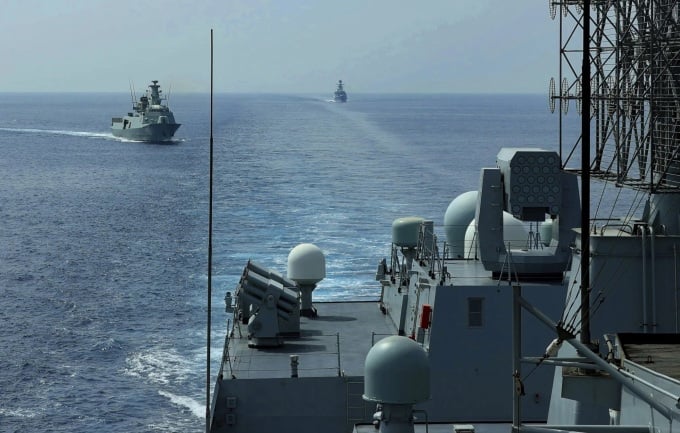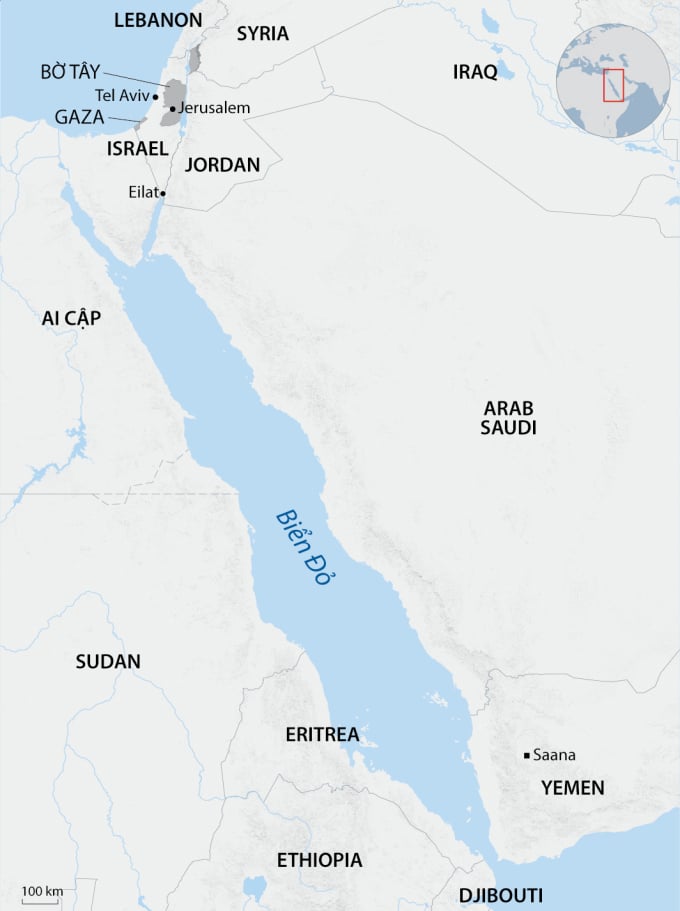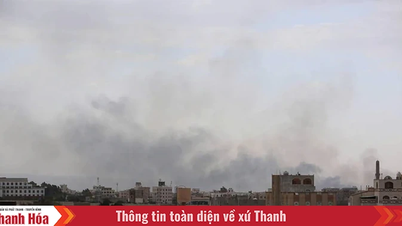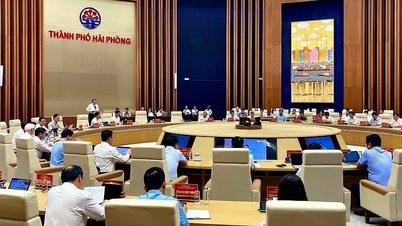Houthi attacks in the Red Sea are threatening China's national interests, but Beijing is reluctant to intervene due to limited resources and a neutral stance.
"The Houthi missile and drone attacks on cargo ships in the Red Sea are damaging to China, so we welcome them playing a constructive role in deterring such actions," US State Department spokesman Matthew Miller said late last month.
In a phone call with his Chinese counterpart Wang Yi later, US Secretary of State Anthony Blinken called on Beijing to join the international naval coalition to protect cargo ships passing through the Red Sea, because Houthi attacks are "an unacceptable threat to maritime security and international law".
But China has so far been lukewarm about the idea of joining the US-led coalition, although Wang Yi said Beijing was "deeply concerned by the serious escalation of the situation in the Red Sea." "We call for a halt to all harassment and attacks on civilian vessels, and for the smooth flow of global industrial and supply chains and the international trade order," Wang said on January 14, during a visit to Egypt.
He did not directly mention the Houthis, the armed forces that control large swathes of territory in Yemen, but stressed that "all parties" needed to cooperate to maintain safety in the Red Sea in accordance with international law.

Chinese warships conduct drills off the coast of Oman in 2023. Photo: PLA
Instability in this strategic sea poses many risks to China's long-term commercial interests in the region, according to Ahmed Aboudouh, an expert on the Middle East and North Africa at Britain's Chatham House.
The Red Sea and the Suez Canal are crucial pieces of the Chinese supply chain to European markets. Beijing has invested tens of billions of dollars in Egypt, which manages the Suez Canal, in infrastructure, transportation, and energy, according to the American Enterprise Institute (AEI).
Before the Israel-Hamas war broke out, mainland Chinese and Hong Kong companies had pledged to invest more than $20 billion in a series of projects along the Suez Canal. China recently agreed to extend a $3.1 billion loan limit to Egypt, according to the World Bank.
COSCO, a Chinese state-owned shipping company, suspended all services to Israel on January 7 due to security concerns. The company invested $1 billion in Egyptian port infrastructure in March 2023. COSCO and CK Hutchison, a Hong Kong-based port investment group, also announced a $700 million plan last year to build two new container terminals in the Red Sea and the Mediterranean.
In October 2023, Egypt's Suez Canal Economic Zone received $6.75 billion in investment from state-owned China Energy Corporation (CEEC) and $8 billion from Hong Kong-based United Energy Group.
The increasing frequency of attacks on cargo ships in the Red Sea may be worrying Chinese investors, especially as they have spent a lot of money building infrastructure to serve the Belt and Road Initiative (BRI) to connect trade between Asia and Europe.
China also imports about half its oil from the Middle East, and exports more to the European Union than to the United States, much of it transported through the Red Sea.

Location of Yemen and countries in the region. Graphics: AFP
The Red Sea crisis threatens not only China's trade, but also the superpower's image.
While Beijing advocates non-interference in the internal affairs of other countries and neutrality in conflict zones around the world, analysts say this policy is causing confusion for Beijing as BRI members seek its support to respond to security challenges in the Red Sea.
China has a regular naval presence in the Middle East and West Africa, primarily serving anti-piracy patrols. At the time of the Gaza conflict, the Chinese navy had at least six warships in the region, including a Type 052D guided-missile destroyer and a Type 052 destroyer, according to the country’s Ministry of National Defense.
The Chinese navy has also intervened in maritime security incidents in the region. In 2022, a group of fishing vessels called for help from Chinese warships, including a Type 052 destroyer, after they spotted pirate speedboats en route to the Bab al-Mandeb Strait off Yemen.
However, the Chinese navy has so far refused to join the US-led Prosperity Protection Coalition to prevent Houthi attacks.
"China's military resources in the Gulf are quite limited and they certainly do not want to be dragged into a large-scale conflict. If China speaks out more aggressively, they may offend Iran and suffer unnecessary damage," said William Figueroa, a China-Middle East expert at the University of Groningen in the Netherlands.
China's foreign minister stressed that the country wants to play a "constructive" role in international hotspots, and only advocates creating an impact "through its influence, appeal and strength" on the international stage. Beijing's responses to the Red Sea crisis have so far been limited to diplomatic channels, avoiding the use of "strength" to protect its interests.
Another reason why China is reluctant to intervene in the Red Sea is that Houthi attacks have mainly targeted cargo ships with ties to Israel and the United States. Chinese officials have not recorded any incidents affecting Chinese-related cargo ships in the area.
As a country with a policy of neutrality in international conflicts, China has not yet found the situation in the Red Sea urgent enough for them to increase pressure on relevant parties, or directly intervene to protect cargo ships moving on this sea route, according to experts.
As long as Chinese ships are not directly threatened, China can continue to stay out of the crisis, even as the US and its partners continue to launch missiles into Yemen and the Houthi group fires missiles in response.
According to Josef Gregory Mahoney, an international relations expert at East China Normal University, Beijing wants to avoid the political and diplomatic consequences of confronting the Houthi forces. It does not want to show its strength in an area too far from its territory and raise Western concerns about its military potential.
At the same time, Beijing can take advantage of improving its position in the region with a message of neutrality and calls for respect for Yemen's sovereignty, even though the Houthi government in Sanaa has only been recognized by two countries: Syria and Iran.
"The Houthi attacks also provide Beijing with a basis to increase its criticism of the US for fueling conflict and instability in the region," Aboudouh said. Through this, China will highlight its image as a reliable mediator, possibly in disagreements in the Middle East, which was partly demonstrated by the Iran-Saudi Arabia diplomatic rapprochement agreement last year.
Thanh Danh (According to Reuters, Chatham House, USNI )
Source link


![[Photo] Prime Minister Pham Minh Chinh attends the Patriotic Emulation Congress of Hanoi city](https://vphoto.vietnam.vn/thumb/1200x675/vietnam/resource/IMAGE/2025/10/10/1760078918257_dsc-2008-jpg.webp)
![[Photo] Unique Phu Gia horse hat weaving craft](https://vphoto.vietnam.vn/thumb/1200x675/vietnam/resource/IMAGE/2025/10/10/1760084018320_ndo_br_01-jpg.webp)
![[Photo] Standing member of the Secretariat Tran Cam Tu works with the Standing Committee of the Party Committee of the Ministry of Health](https://vphoto.vietnam.vn/thumb/1200x675/vietnam/resource/IMAGE/2025/10/10/1760079818773_image-4-6972-jpg.webp)

![[Photo] "Exposing letters" in the flood center of Lang Son](https://vphoto.vietnam.vn/thumb/1200x675/vietnam/resource/IMAGE/2025/10/10/1760080117518_ndo_br_z7101324112737-07cd4d1c01801a8ccf4ae0cbaf31c4a3-507-jpg.webp)































































![[Photo] President Luong Cuong presents decisions on conferring titles and appointing Vietnamese Ambassadors](https://vphoto.vietnam.vn/thumb/402x226/vietnam/resource/IMAGE/2025/10/10/1760082105623_image-1.jpeg)



































Comment (0)